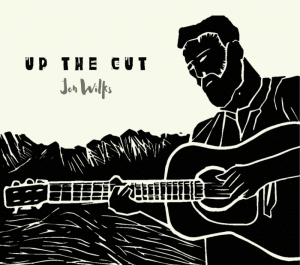 Once again, following Midlife, the redoubtable Birmingham folkie has delved into the archives to emerge with Up The Cut, another selection of largely unknown and unheard (some not for 180 years) traditional songs from Birmingham and the Midlands, this time featuring just his voice and guitar.
Once again, following Midlife, the redoubtable Birmingham folkie has delved into the archives to emerge with Up The Cut, another selection of largely unknown and unheard (some not for 180 years) traditional songs from Birmingham and the Midlands, this time featuring just his voice and guitar.
It opens with ‘Pretty Girls Of Brummagem’, the words, published locally in 1833, taken from Birmingham Ballads, compiled by the late Roy Palmer in 1979 for the City of Birmingham Education Department and set to Wilks’ original fingerpicked tune offering an insight into love and life in Victorian Birmingham with its descriptions of the moustachioed dandy strutting down New Street, the shopman spending all his cash “to cut a dash”, the aspirational chimney sweep looking to scrub up well and the gout-ridden old codger, all seeking to “charm the girls of Brum”.
One of four passing the five-minute mark, the lyrics to ‘The Stowaway’ come from Bodleian Harding collection, while the song, a swayalong sentimental old music hall number, was another collected by Palmer, here from Staffordshire’s George Dunn, the narrative concerning a “poor little ragged young urchin” caught stowing away on a ship sailing from Liverpool to Canada, hidden there by his impecunious step-father in the hope of him finding a better life and winning over the crew with his honesty.
The two following songs are more familiar and again both collected by Palmer from Dunn, the first a frisky arrangement of Edward, part of the Child collection, about a case of fratricide following his brother “killing three little dicky birds/That flew from tree to tree” and of fleeing to America, the second being ‘John Riley’, in which a wealthy farmer’s daughter runs off with her impoverished lover after dad vows to shoot him, both ending up drowned in a shipwreck, the version here a little known variant.
Another Child ballad thought to date back to a 14th century poem called ‘Sir Eglamour Of Artois’ and given an appropriately courtly arrangement with a dash of jazz guitar, ‘The Jovial Hunter Of Bromsgrove’ is better known as ‘Bold Sir Rylas’, Wilks’ fingers darting around the fretboard while his phrasing has a touch of the Jake Thackray.
Like ‘Holly Ho’ from a previous EP, the little known ‘The Tramp’s Philosophy’ was collected by Phil Drabble from the singing of Joe Mallen at the Old Cross Guns pub in Cradley Heath in the Black Country. Sung unaccompanied and again suggesting music hall origins, it tells of an old tramp being made fun of by “a gang of young sportsmen” but reminding them his fate could well have been theirs because “you can’t put a stop to misfortune/For whatever will be will be”.
From worldly wisdom to bemoaning the cost of living ‘How Five And Twenty Shillings Were Expended In A Week’, again from Palmer’s collection of broadsides and set to a lively arrangement of ‘The Nutting Girl’, this is proudly Brummie, the lyrics, in which a tradesman’s wife gives her moaning husband an account of the household budget (and trips to the boozer), sporting dialect of the time like “bonny cock of wax“, “congresses” (matches), “swipes” (small beers) and “strings” (shoelaces).
Another with a strong Birmingham connection is the mournful and melancholic ‘The Lover’s Ghost’, another Child ballad, learnt, as with many of Wilks recordings, from the singing of Irish-born Digbeth resident Cecilia Costello, although the fairly self-explanatory song itself dates back to at least the seventeenth century.
The musical mood lives up for the penultimate track, ‘Little Grey ‘Oss’, another from the singing of Dunn, but collected by Ewan MacColl and Peggy Seeger (who knew it as (‘The Adventures Of A Penny’), the narrator recounting having spent all his money on good company, getting into a game of dice at an alehouse and not only emerging five pounds richer (if not, he’d have had to sell his grey ‘oss, hence the title), but only being charged kiss by the landlady for the drink and bed. You don’t get that at a Travelodge.
After such licentiousness, Up The Cut ends on a sober note with a rendition of ‘God Rest Ye Merry Gentlemen’, albeit here taken from an obscure variation printed in Birmingham in the early 1800s with a line about throwing down Satan that doesn’t appear in other versions.
So, another terrific, suitably spit and sawdust collection of traditional folk songs, many dusted down and rescued from obscurity and given a suitably robust Wilks treatment. Glorious.
Mike Davies
Artist’s website: www.jonwilks.online
‘God Rest Ye Merry Gentlemen’ – lyric video:
 Thanks for stopping by. Please help us continue and support us by tipping/donating to folking.com via
Thanks for stopping by. Please help us continue and support us by tipping/donating to folking.com via
You must be logged in to post a comment.